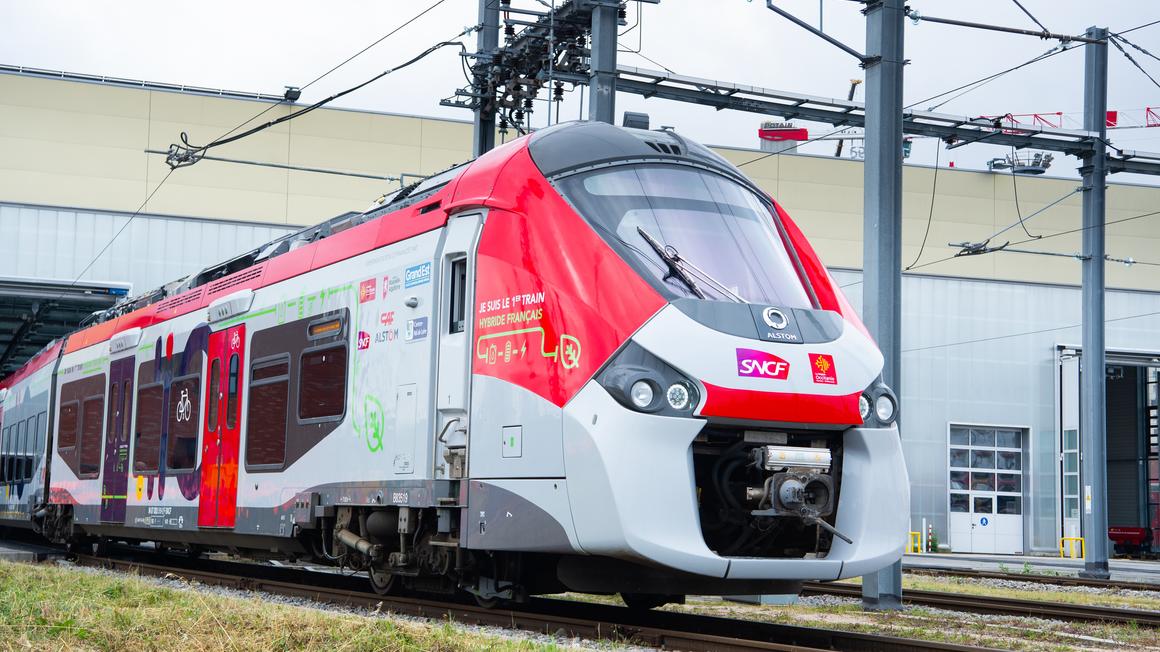 Alstom has successfully completed the first tests of a hybrid electric-diesel-battery train on the Toulouse-Mazamet and Toulouse-Rodez lines in the South of France. The aim was to observe how the hybrid regional train performs on real line profiles and in real conditions, according to the timetable of a commercial service. Commercial service will begin in a few months, as soon as the Etablissement Public de Sécurité Ferroviaire (EPSF) has issued the necessary authorisations for passenger transport.
Alstom has successfully completed the first tests of a hybrid electric-diesel-battery train on the Toulouse-Mazamet and Toulouse-Rodez lines in the South of France. The aim was to observe how the hybrid regional train performs on real line profiles and in real conditions, according to the timetable of a commercial service. Commercial service will begin in a few months, as soon as the Etablissement Public de Sécurité Ferroviaire (EPSF) has issued the necessary authorisations for passenger transport.
This is the first hybridisation project for a Régiolis train in France. It was launched in 2018 by the SNCF Group and Alstom, with the mobilisation and financial participation of 4 French Regions (Occitanie, Grand Est, Nouvelle-Aquitaine, and Centre-Val de Loire), and the provision by the Occitanie Region of a trainset from its liO fleet. The objectives are to reduce energy consumption and cut greenhouse gas emissions, thanks to a solution that allows the existing thermal fleet to be modified without having to modify the existing infrastructure.
Along with the battery-powered train and the hydrogen train, the hybrid train is one of the three decarbonisation technologies that the SNCF Group is developing with its partners Alstom, CAF, and the French Regions for passenger transport on non-electrified (or partially electrified) regional lines.
Hybridisation of the Régiolis trainset involved replacing half of the thermal engines with energy storage systems consisting of lithium-ion batteries. This operation was carried out at the beginning of 2021 at the CAF site in Reichshoffen, formerly owned by Alstom, following an initial validation phase for the new energy storage systems at the end of 2020 at the Alstom site in Tarbes, centre of excellence for “green traction” systems.
One car of the train has also been temporarily fitted with a laboratory and multiple sensors to measure the train’s energy flows.
At the end of this test phase, on 14 June, the electric-diesel-battery train was presented at the Occitanie Technicentre by Jean-Luc Gibelin, Vice-President of the Occitanie Region with responsibility for Mobility and Transport Infrastructure, Philippe Bru, Regional Director of SNCF Voyageurs Occitanie, and Kaïs Albouchi, Director of the Régiolis Hybrid and Hydrogen Projects at Alstom.
Equipped with its two energy storage systems and its laboratory car, the trainset has started its tests in the second half of 2021. A static and dynamic fine-tuning phase at up to 60 km/h took place at Reichshoffen to check the train’s operation and test the hybrid traction mode. Tests then continued on the Vélim test track in the Czech Republic, with validation and certification tests at up to 160 km/h. This enabled all the train’s new traction modes to be tested at their operating speed, and the route simulation models to be validated.
The tests showed that the train performed as expected. The braking energy recovery rate, used to recharge the batteries, is very high, at over 90%, enabling energy savings of up to 20%, depending on the route. The zero-emission battery-powered mode is designed to power the train for a few kilometres without the need to use internal combustion engines, a feature that could be useful for low-carbon journeys in built-up areas. On non-electric lines, the hybrid regional train retains the range of the initial model for up to 1,000 km.
With the final tests on the national rail network having taken place in April, SNCF Voyageurs has now to submit the admission file to the Etablissement public de sécurité ferroviaire (EPSF) with a view to obtaining the necessary authorisations for its commercial operation. SNCF Voyageurs will also use this period to prepare for the launch of the trainset in the various regions (traffic plan, staff training, etc.).
The start of the experimental commercial service is scheduled for the end of 2023 in Occitanie, particularly on the Mazamet – Toulouse and Rodez – Toulouse lines. The modified trainset will then run throughout 2024 in the Nouvelle-Aquitaine, Grand Est, and Centre-Val de Loire regions.
The development of the hybrid electric-diesel-battery train had a total budget of EUR 16,85 million, of which SNCF and Alstom each contributed with EUR 3.8 million euro, Occitanie, Nouvelle-Aquitaine and Grand Est regions with EUR 3 million each and the Centre Val de Loire Region with EUR 250,000.
Share on:



